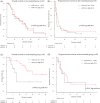Clinical usefulness of geriatric assessment in elderly patients with unresectable hepatocellular carcinoma receiving sorafenib or lenvatinib therapy
- PMID: 35302279
- PMCID: PMC9675392
- DOI: 10.1002/cnr2.1613
Clinical usefulness of geriatric assessment in elderly patients with unresectable hepatocellular carcinoma receiving sorafenib or lenvatinib therapy
Abstract
Background: Therapeutic strategies for unresectable hepatocellular carcinoma (u-HCC) in geriatric patients are important for real-world practice. However, there remain no established biomarkers or therapeutic strategies regarding the best second-line agent after atezolizumab plus bevacizumab therapy.
Aim: In this study, we investigated the usefulness of modified Geriatric 8 (mG8) score in examining elderly patients (≥75 years old) with unresectable hepatocellular carcinoma (u-HCC) using sorafenib or lenvatinib as first-line therapy.
Methods and results: This study assessed 101 elderly patients with u-HCC for their mG8 score (excluding elements of age from 8 items) and classified them into 2 groups according to their mG8 score: ≥11 as the high-score group and ≤ 10 as the low-score group. Among those taking sorafenib, no significant differences were noted in overall survival (OS) and progression free survival (PFS) between low and high mG8 score groups. Only modified albumin-bilirubin (ALBI) grade (2b/3 vs. 1/2a: HR 0.34; 95% CI, 0.17-0.69; p = .0029) was significantly associated with OS. Among those taking lenvatinib, patients with a high mG8 score (n = 26) had longer survival than those with a low mG8 score (n = 10) (20.0 months vs. 7.7 months: HR 0.31, 95% CI 0.11-0.89; p = .029). Intrahepatic tumor volume (<50% vs. ≥50%: HR 16.7; 95% CI, 1.71-163; p = .016) and α-fetoprotein (AFP) (<400 vs. ≥400: HR 3.38; 95% CI 0.84-19.7; p = .031) remained significant factors independently associated with OS.
Conclusions: The mG8 score may contribute to making a decision when considering either sorafenib or lenvatinib as a treatment option for u-HCC in elderly patients.
Keywords: 1; Geriatric 8 score; hepatocellular carcinoma 2; lenvatinib 4; sorafenib 3.
© 2022 The Authors. Cancer Reports published by Wiley Periodicals LLC.
Conflict of interest statement
Kaoru Tsuchiya, Masayuki Kurosaki, and Namiki Izumi received advisory board fees and honoraria for speakers' bureau from Bayer, Eli Lilly Japan, Chugai Pharmaceutical Company, and Eisai. The Japanese Ministry of Health, Labour and Welfare had no role in the design of the study; in the collection, analysis, or interpretation of data; in the writing of the manuscript, or in the decision to publish the results.
Figures



Similar articles
-
Atezolizumab plus bevacizumab versus lenvatinib or sorafenib in non-viral unresectable hepatocellular carcinoma: an international propensity score matching analysis.ESMO Open. 2022 Dec;7(6):100591. doi: 10.1016/j.esmoop.2022.100591. Epub 2022 Oct 6. ESMO Open. 2022. PMID: 36208496 Free PMC article.
-
Lenvatinib is independently associated with the reduced risk of progressive disease when compared with sorafenib in patients with advanced hepatocellular carcinoma.J Gastroenterol Hepatol. 2021 May;36(5):1317-1325. doi: 10.1111/jgh.15355. Epub 2020 Dec 28. J Gastroenterol Hepatol. 2021. PMID: 33217054
-
Sorafenib vs. Lenvatinib in advanced hepatocellular carcinoma after atezolizumab/bevacizumab failure: A real-world study.Clin Mol Hepatol. 2024 Jul;30(3):345-359. doi: 10.3350/cmh.2023.0553. Epub 2024 Mar 12. Clin Mol Hepatol. 2024. PMID: 38468561 Free PMC article.
-
Impact of Post-progression Survival on Outcomes of Lenvatinib Treatment for Unresectable Hepatocellular Carcinoma: A Systematic Review and Retrospective Cohort Study.Anticancer Res. 2022 Dec;42(12):6007-6018. doi: 10.21873/anticanres.16112. Anticancer Res. 2022. PMID: 36456142
-
Efficacy and Safety of Sorafenib or Lenvatinib for Advanced Hepatocellular Carcinoma after Failure of First-Line Atezolizumab Plus Bevacizumab: A Systematic Review and Meta-Analysis.Cancers (Basel). 2024 Aug 10;16(16):2813. doi: 10.3390/cancers16162813. Cancers (Basel). 2024. PMID: 39199586 Free PMC article. Review.
Cited by
-
Effect of Immunotherapy on Late Elderly Patients With Unresectable Hepatocellular Carcinoma: A Real-World Clinical Study.Cancer Med. 2025 Sep;14(17):e71171. doi: 10.1002/cam4.71171. Cancer Med. 2025. PMID: 40856425 Free PMC article.
-
The prognostic role of Geriatric 8 in patients with cancer: a meta-analysis and systematic review.Oncologist. 2025 Jun 4;30(6):oyaf118. doi: 10.1093/oncolo/oyaf118. Oncologist. 2025. PMID: 40542587 Free PMC article.
-
Lenvatinib and immune-checkpoint inhibitors in hepatocellular carcinoma: mechanistic insights, clinical efficacy, and future perspectives.J Hematol Oncol. 2024 Dec 21;17(1):130. doi: 10.1186/s13045-024-01647-1. J Hematol Oncol. 2024. PMID: 39709431 Free PMC article. Review.
-
Use of lenvatinib in the treatment of radioiodine-refractory differentiated thyroid cancer: a multidisciplinary perspective for daily practice.Eur Thyroid J. 2023 Aug 8;12(5):e230068. doi: 10.1530/ETJ-23-0068. Eur Thyroid J. 2023. PMID: 37429326 Free PMC article.
-
Analysis of prognosis and background liver disease in non-advanced hepatocellular carcinoma in two decades.PLoS One. 2024 Mar 7;19(3):e0297882. doi: 10.1371/journal.pone.0297882. eCollection 2024. PLoS One. 2024. PMID: 38452155 Free PMC article.
References
-
- Sung H, Ferlay J, Siegel RL, et al. Global cancer statistics 2020: GLOBOCAN estimates of incidence and mortality worldwide for 36 cancers in 185 countries. CA Cancer J Clin. 2021;71(3):209‐249. - PubMed
-
- Bellera CA, Rainfray M, Mathoulin‐Pelissier S, et al. Screening older cancer patients: first evaluation of the G‐8 geriatric screening tool. Ann Oncol. 2012;23(8):2166‐2172. - PubMed
-
- Ishii R, Ogawa T, Ohkoshi A, Nakanome A, Takahashi M, Katori Y. Use of the Geriatric‐8 screening tool to predict prognosis and complications in older adults with head and neck cancer: a prospective, observational study. J Geriatr Oncol. 2021;12(7):1039‐1043. - PubMed
-
- Middelburg JG, Middelburg RA, van Zwienen M, et al. Impaired geriatric 8 score is associated with worse survival after radiotherapy in older patients with cancer. Clin Oncol (R Coll Radiol). 2021;33(4):e203–e10. - PubMed
-
- van Walree IC, Scheepers E, van Huis‐Tanja L, et al. A systematic review on the association of the G8 with geriatric assessment, prognosis and course of treatment in older patients with cancer. J Geriatr Oncol. 2019;10(6):847‐858. - PubMed
Publication types
MeSH terms
Substances
LinkOut - more resources
Full Text Sources
Medical

